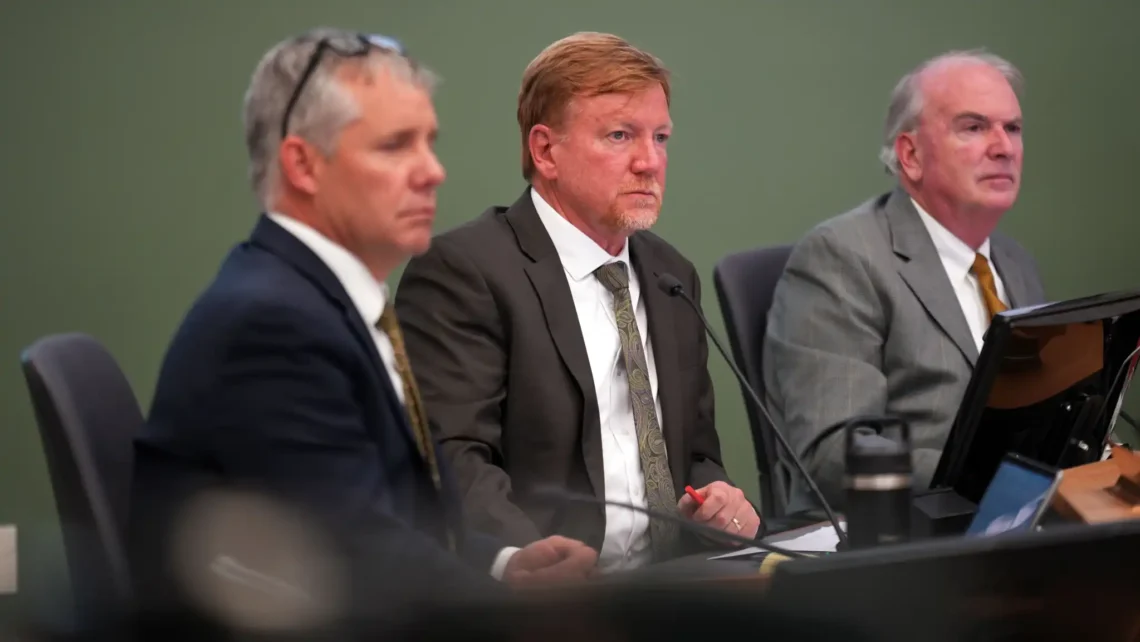The city’s commission voted to criminalize camping on city streets beginning next year, with stricter regulations in place until then
By Matt Standal MONTANA FREE PRESS
So-called “urban campers” will find themselves with a strict new set of rules to abide by in the city of Bozeman in the coming months.
That’s after the Bozeman City Commission voted Tuesday night to put an expiration date on the city’s tolerance of people living in vehicles, campers, trailers and tents on city streets.
Going forward, the commission is expected to formally adopt ordinance 2172, which sets an expiration date on urban camping in the city, and until then gives the city manager full authority to move campers to wherever he sees fit and creates a permit system that includes $25 per month fees. Permits would be granted for up to 30 days, with renewals considered on a case-by-case basis.
The ordinance criminalizes urban camping in Bozeman on Nov. 1, 2025.
The ordinance also includes stricter rules on generator noise, adherence to proper vehicle maintenance, disallowing camping near cemeteries, wetlands, and waterways, and fines for those who try to rent or facilitate urban campsites.
The new rules will be backed by misdemeanor criminal fines from $100 to $500 and up to 10 days in jail for those who fail to comply.
Bozeman’s previous urban camping ordinance imposed $25 civil fees for infractions, similar to parking tickets, and fewer pathways for criminal enforcement.
Interim City Manager Chuck Winn said the current ordinance isn’t working, but the new set of rules regulating exactly where and for how long people can camp in Bozeman will ultimately lead to fewer homeless people in the city.
“Through this ordinance, we are going to see less campers on the street,” Winn said. “We know that for a fact.”
Commissioners debated the issue for longer than five hours on Tuesday, with most admitting that the new rules weren’t perfect, but something had to be done.
“We don’t have great tools,” Bozeman Mayor Terry Cunningham said while describing the controversial ordinance. “They’re limited and they’re blunt.”
Much of the debate among commissioners centered on criminal fines imposed by the ordinance, with Cunningham questioning whether the new rules would essentially make being homeless illegal and overwhelm destitute campers who have mental health issues.
Commissioner Emma Bode questioned the bill’s year-long sunset clause on urban camping, asking whether it would create a sense of “artificial urgency” and would keep campers on edge.
Deputy Mayor Joey Morrison said it’s a logical error to think that if the city punishes urban campers the problem of homelessness would go away. He said adding more barriers to getting into housing is just that — adding more barriers.
“It actually punishes those with the least likelihood of compliance the harshest,” Morrison said.
Ultimately, commissioners voted 3-2 to pass the ordinance, with Morrison and Bode voting against it.
Bozeman now joins the cities of Missoula, Billings and Helena in cracking down on urban camping in the wake of the controversial U.S. Supreme Court decision Johnson v. Grants Pass, which was decided in April.
The ruling restored municipalities’ power to decide when, where and how homeless people can create shelters or camp within city limits.
City statistics paint a problematic picture of Bozeman’s urban camping situation. Since July, more than 23 tons of garbage, 15 pickup truck loads of junk, and 36 buckets of human feces have been removed from camps.
Police records from the same period show more than 1,000 calls for service, or 7.5% of the city’s entire 911 call volume, traced back to the urban camps.
A survey of Bozemanities, including those who are unhoused, showed overwhelming support for better policing and more effective rules, according to the city attorney’s office.
However, for 26-year-old Levi Ludwig, Bozeman’s crackdown on urban camping means he feels targeted and unfairly blamed for problems other homeless people create.
Ludwig, who told Montana Free Press that he moved from Billings two years ago, said he lives with three other people in a camper on Bozeman’s streets, and two of his roommates struggle with mental illness.
Ludwig, who works as a political canvasser, earns about $1,200 per month. Most of it goes to child support and other bills. What little he has left is used for food and a small amount of savings.

He feels that people who are homeless in Bozeman should have a larger say in what happens to them, rather than those who don’t live on the street and who might not understand the situation. Ludwig said the new fee structure and permitting system are also confusing.
“So, do we all pay $25 a person to be in the camper?” Ludwig asked.
Not everyone at Tuesday’s meeting agreed that more fines and jail time were the answer to Bozeman’s homeless problem.
Heather Grenier, president and CEO of the Human Resources Development Council, said her organization has seen homelessness more than triple in Bozeman since 2019. Currently, she said about 409 people are homeless in Bozeman.
HRDC operates Bozeman’s Warming Center, an emergency shelter that can accommodate approximately 105 people. The organization is currently building Homeward Point, a $16.5 million facility that would house 136.
“We’ve invested millions of dollars to address the problem on the ground so far,” Grenier said.
Grenier asked commissioners to “be brave” and earmark city funds to create meaningful housing opportunities for urban campers who are struggling to move out of trailers or vehicles parked on the street.
“We need transitional housing, investments and a real solution,” Grenier told the commission.











